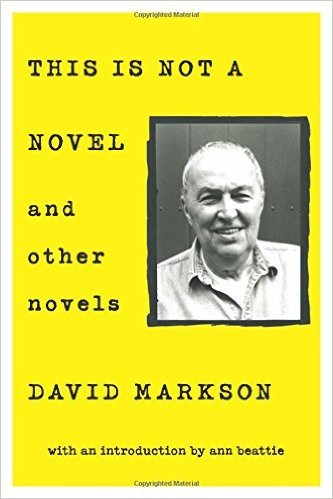David Markson

This Is Not a Novel and Other Novels
David Markson
David Markson was a writer like no other. In his novels, which have been called "hypnotic," "stunning," and "exhilarating" and earned him praise from the likes of Kurt Vonnegut and David Foster Wallace, Ann Beattie and Zadie Smith. Markson created his own personal genre. With crackling wit distilled into incantatory streams of thought on art, life, and death, Markson's work has delighted and astonished readers for decades.
Now for the first time, three of Markson's masterpieces are compiled into one page-turning volume: This Is Not a Novel, Vanishing Point, and The Last Novel. In This Is Not a Novel, readers meet an author, called only "Writer," who is weary unto death of making up stories, and yet is determined to seduce the reader into turning pages and getting somewhere. Vanishing Point introduces us to "Author," who sets out to transform shoeboxes crammed with note cards into a novel. In The Last Novel, we find an elderly author (referred to only as "Novelist") who announces that, since this will be his final effort, he possesses "carte blanche to do anything he damn well pleases."
United by their focus on the trials, calamities, absurdities and even tragedies of the creative life, these novels demonstrate David Markson's extraordinary intellectual richness--leaving readers, time after time, with the most indisputably original of reading experiences.

Vanishing Point
David Markson
In the literary world, there is little that can match the excitement of opening a new book by David Markson. From Wittgenstein’s Mistress to Reader’s Block to Springer’s Progress to This Is Not a Novel, he has delighted and amazed readers for decades. And now comes his latest masterwork, Vanishing Point, wherein an elderly writer (identified only as "Author") sets out to transform shoeboxes crammed with notecards into a novel — and in so doing will dazzle us with an astonishing parade of revelations about the trials and calamities and absurdities and often even tragedies of the creative life — all the while trying his best (he says) to keep himself out of the tale. Naturally he will fail to do the latter, frequently managing to stand aside and yet remaining undeniably central throughout — until he is swept inevitably into the narrative’s startling and shattering climax. A novel of death and laughter both — and of extraordinary intellectual richness.

This Is Not a Novel
David Markson
The Barnes & Noble Review
This experimental work is an enthralling amalgamation of anecdotes, aphorisms, and quotations from writers and artists, interspersed with self-reflexive comments by the Writer who has assembled them. As the title implies, this is certainly not a novel -- not in the general sense of the term. And yet a reader who follows the flow will gradually notice certain novelistic conventions insinuating themselves. Writer -- as the narrator refers to himself -- is tired of inventing characters and subjecting them to the rigors of plot development. Instead, historical personages from Dickens to Beethoven recur throughout the book: They re born, create, speak fondly or acidly of their own work and the work of others, and then die. (Death, in fact, is a major concern of Writer.) Works of art interlock and interrelate; diary entries, attributions, and critical comments jostle for position. But what at first appear to be random bits of historical trivia ultimately come together with a narrative logic: a beginning, middle, and end. So while Markson has jettisoned the standard conflict-and-resolution pattern of a novel, he nevertheless fashions a literary journey that gets somewhere. Indeed, the book s conclusion will come as an intensely moving surprise to those who reach it.
Does Writer even exist in a book without characters? the narrator wonders. Passing through a period of aging and self-doubt, Writer looks deeply inside himself over the course of the book and worries about his very purpose. The real question hovering in the margins of this beguiling work is, Why do I write? Many an artist suffers under the burdens of posterity, the sinking feeling that words and works will fade with the passage of time. Eventually, though, this particular Writer answers in a qualified affirmative, for he realizes himself to be the main character in his own life. That which is not a novel, he implies, is life itself; creating art is what the artist does to live. In the end, out of a shared sense of mortality and its frailties and beauties, we can only agree. (Jonathan Cook)